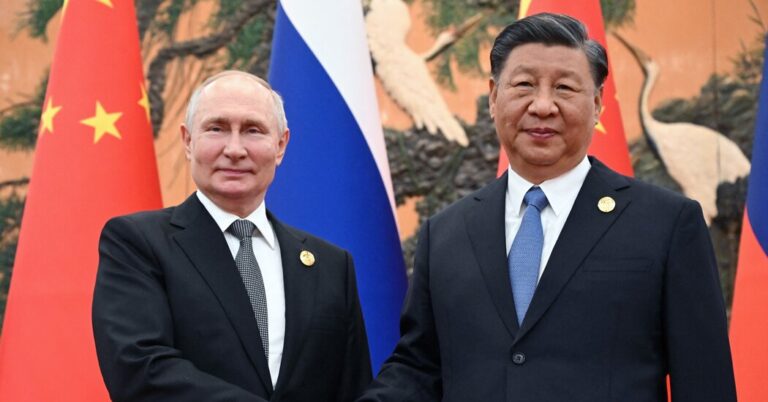When Chinese leader Xi Jinping receives Russian President Vladimir V. Putin this week, the two leaders are expected to present a united front. But they have different agendas.
Mr. Putin is trying to escalate the war in Ukraine before the Ukrainian military receives arms supplies from the United States, and perhaps wants to know if he can rely on China. Mr. Xi will seek to strengthen his strategic partner and “old friend,” but he is also under pressure to avoid further alienating the West over its support for Russia.
These priorities are behind Putin’s two-day state visit. The visit begins Thursday in Beijing and will include a visit to the northeastern city of Harbin, where the China-Russia trade fair is being held.
Putin will likely seek further support from Beijing, which has provided the Kremlin with a lifeline since Western sanctions were imposed over Russia’s invasion of Ukraine more than two years ago. China buys large amounts of Russian oil and provides technology that helps Russia survive economic isolation and maintain its war machine.
Mr. Xi sees Russia as an important counterweight in China’s conflict with the United States, but he also sees Russia as an important counterweight in China’s conflict with the United States, but he is also concerned about Europe, its main trading partner, at a time when China relies on exports to revive its ailing economy. There is a risk of alienation.
Here’s what you need to know about the summit.
Personal relationships and common vision
The visit will be Putin’s first overseas trip since winning the fifth presidential election in March. Mr. Xi paid a similar tribute to Mr. Putin on his first overseas trip since securing an unusual third term as China’s president in March 2023.
Mr. Xi has met with Mr. Putin more than 40 times, including virtually, more than any other leader. The two exchange birthday greetings and refer to each other as “old” and “dear” friends, indicating that their relationship is deeply personal.
Mr. Xi sees in Mr. Putin a like-minded authoritarian leader who blames the United States for hindering his country’s rise. The two leaders declared an “unlimited” partnership to counter what they see as American hegemony, weeks before Russia’s invasion of Ukraine in 2022.
Mr. Xi and Mr. Putin also see themselves as architects of a new world order without U.S. interference. Both leaders have promoted multilateral groupings of developing countries, such as the Shanghai Cooperation Organization and BRICS (so named because they include Brazil, Russia, India, China and South Africa), as a means of countering the West. Ta.
Mr. Xi and Mr. Putin are likely to try to project strength and unity at the summit to show other countries that there is an alternative to the U.S.-led global system.
“Russia-China relations have reached an all-time high, and they continue to strengthen even in the face of the difficult international situation,” Putin said in an interview with Chinese state media published Wednesday.
What President Putin wants
China has vowed not to provide lethal weapons to Russia, but U.S. and Western analysts say China is supporting Russia with satellite intelligence and parts for fighter jets, as well as microchips and machine tools. The company says it supplies parts for both civilian and military use. optical devices, electronic sensors, communication equipment, etc.
Mr. Putin will want continued supplies of such parts and equipment to keep the military moving forward as it ramps up the war effort.
In recent days, Russian forces have opened a new line of attack near Kharkiv, Ukraine’s second-largest city. Ukraine’s military is thin and short on weapons, but billions of dollars worth of weapons are expected to trickle in soon from the United States.
Mr Putin is also expected to seek further trade and business deals.
Putin has been trying for years to secure a deal on the Power of Siberia 2 gas pipeline, which would divert Russian gas supplies destined for Europe to China instead. It is unclear whether Mr. Xi is interested in the pipeline. Analysts say Chinese leaders could be reluctant to go through a third country, Mongolia, exposing China to potential secondary sanctions and further increasing its energy dependence on Russia. It has been pointed out that this is likely to increase.
President Xi’s strategic straddle
Mr. Xi has sought to align himself with Russia and at the same time forge stable relations with the West to support its deteriorating economy, an approach some have called strategic straddling.
China claims to be neutral in the Ukraine war and a supporter of peace. The government presented a vague 12-point plan for a political solution to the war and sent special envoys to conduct shuttle diplomacy in Europe.
Western countries have ignored China’s efforts, saying China has not called for the withdrawal of Russian troops from Ukraine. China also sides with Russia, blaming the expansion of the North Atlantic Treaty Organization for creating the tensions that led to the Moscow invasion.
Mr. Xi’s refusal to condemn the Kremlin war ultimately soured relations between China and the West and led to Europe becoming more aligned with the United States on security issues. That makes China’s efforts to avoid a trade war with the European Union over China’s electric vehicle exports and market access for European companies more difficult for Mr. Xi.
Tensions with the United States are also rising, putting the tentative détente proposed by President Biden and Mr. Xi in November to the test.The Biden administration on Tuesday announced a significant increase in tariffs It handles a wide range of products imported from China, including electric vehicles, solar cells, semiconductors, and advanced batteries.

